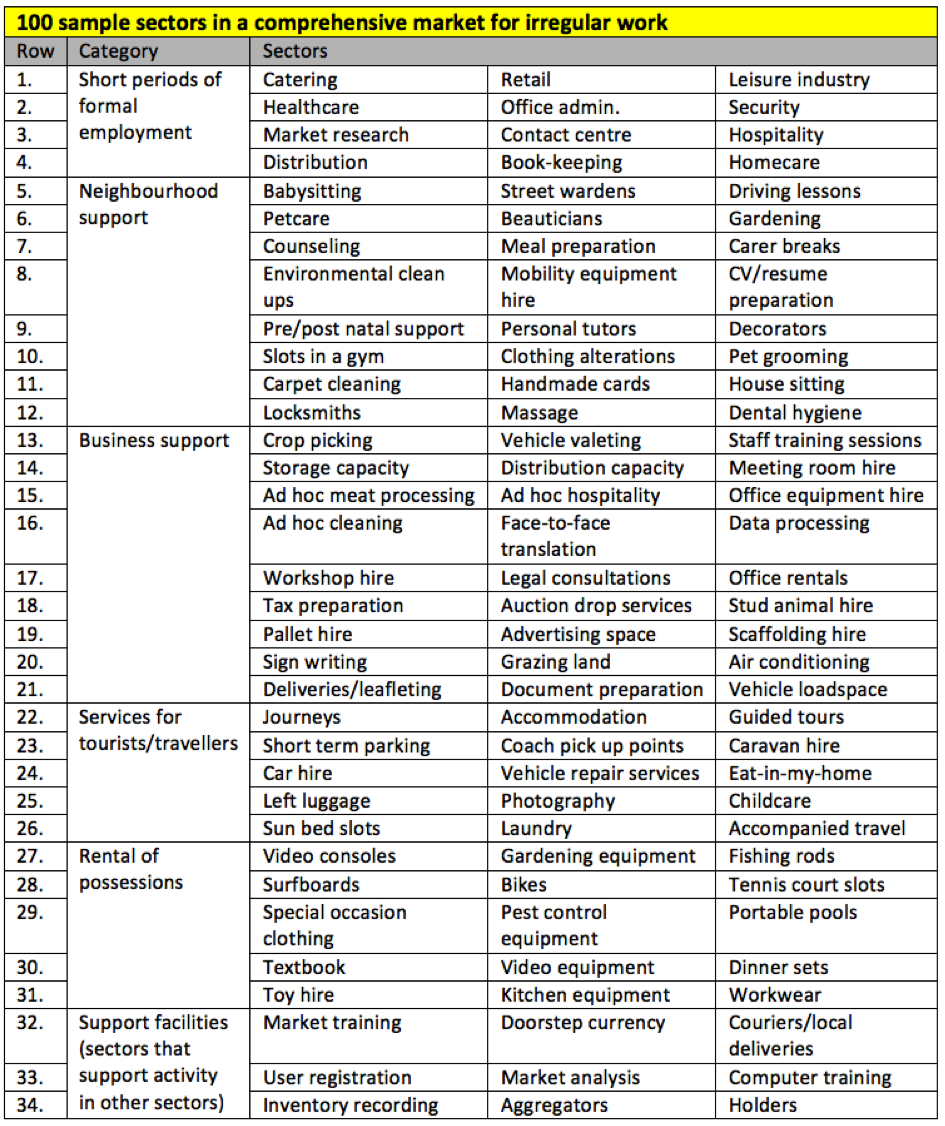[ezcol_2third]
 Irregular work transactions are among the most complex in any market. Many sectors are barely viable until marketplaces improve.
Irregular work transactions are among the most complex in any market. Many sectors are barely viable until marketplaces improve.
Focus on face-to-face
Our focal point is “community transactions”. The defining parameters of this activity are:
- Short term arrangements: transactions involve hire of a person or resource for a few hours. This is not the market for sale of items as offered by sites like eBay, Etsy and Amazon.
- Real world: buyer and sellers meet each other. We are not concerned with digital-work transactions as enabled by sites like PeoplePerHour, Mechanical Turk, oDesk or eLance.
- Small sellers: a babysitting transaction does not require corporate resources, only one reliable, capable, person.
- Low value: a transaction is typically worth less than £50 ($80).
100 sectors

The scope of irregular sectors
Some of these sectors are enormous. Take “Journeys” for example. This one segment on a comprehensive irregular economy platform could ultimately encompass anyone wanting to offer; rideshares, minicabs, limo bikes, peer-to-peer car rental, seats in minibuses even ad hoc coach seats. Regulatory checks and micro-insurance could be built into each purchase.
 Getting from A to B might involve starting on the back of a neighbour’s luxury motorcycle which transfers you to a minibus departing along the freeway to another city from which a local picks you up because her evening commute then goes past your destination point. A co-ordinated platform could pull packages like this together instantly if a buyer wishes. It can then re-jig arrangements if timings change.
Getting from A to B might involve starting on the back of a neighbour’s luxury motorcycle which transfers you to a minibus departing along the freeway to another city from which a local picks you up because her evening commute then goes past your destination point. A co-ordinated platform could pull packages like this together instantly if a buyer wishes. It can then re-jig arrangements if timings change.
Other sectors in the table barely exist at present. “Holders” for example, are people who take in neighbors’ possessions that they then check out and receive back from hirers. You might not be in when someone wants to rent your fishing rods. But a local family might hold them, along with hundreds of other items. The system can split the proceeds according to your arrangement.
Splinters in the economy
Micro-work in sectors like those above is a poorly researched part of labor markets. It is transforming as new web markets get going. But they’re not good enough yet. For more detail, we offer 3 sub pages:
- Why is irregular work important? Bits of work can be a lifeline for individuals and keep economies competitive. → More
- What’s broke? Irregular work is too uncertain, time-consuming to arrange and overhead-laden at present. → More
- One big market? Some economic facilities work best when centralized, huge scale and officially underpinned. → More
[/ezcol_2third] [ezcol_1third_end][/ezcol_1third_end]
